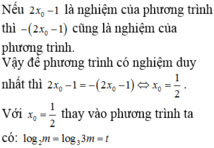Biết rằng phương trình có nghiệm thực duy nhất. Mệnh đề nào dưới đây đúng
Hãy nhập câu hỏi của bạn vào đây, nếu là tài khoản VIP, bạn sẽ được ưu tiên trả lời.


![]()




\(a,3^{1-2x}=4^x\\ \Leftrightarrow1-2x=log_34^x\\ \Leftrightarrow1-2x=xlog_34\\ \Leftrightarrow2x+xlog_34=1\\ \Leftrightarrow x\left(2+log_34\right)=1\\ \Leftrightarrow x=\dfrac{1}{2+log_34}=\dfrac{1}{log_39+log_34}=\dfrac{1}{log_336}=log_{36}3\)
b, ĐK: \(x>-1\)
\(log_3\left(x+1\right)+log_3\left(x+4\right)=2\\ \Leftrightarrow log_3\left(x^2+5x+4\right)=2\\ \Leftrightarrow x^2+5x+4=9\\ \Leftrightarrow x^2+5x-5=0\\ \Leftrightarrow\left[{}\begin{matrix}x=\dfrac{-5+3\sqrt{5}}{2}\left(tm\right)\\x=\dfrac{-5-3\sqrt{5}}{2}\left(ktm\right)\end{matrix}\right.\)

a) \({3^{{x^2} - 4x + 5}} = 9 \Leftrightarrow {x^2} - 4x + 5 = 2 \Leftrightarrow {x^2} - 4x + 3 = 0 \Leftrightarrow \left( {x - 3} \right)\left( {x - 1} \right) = 0\)
\( \Leftrightarrow \left[ \begin{array}{l}x = 3\\x = 1\end{array} \right.\)
Vậy phương trình có nghiệm là \(x \in \left\{ {1;3} \right\}\)
b) \(0,{5^{2x - 4}} = 4 \Leftrightarrow 2x - 4 = {\log _{0,5}}4 \Leftrightarrow 2x = 2 \Leftrightarrow x = 1\)
Vậy phương trình có nghiệm là x = 1
c) \({\log _3}(2x - 1) = 3\) ĐK: \(2x - 1 > 0 \Leftrightarrow x > \frac{1}{2}\)
\( \Leftrightarrow 2x - 1 = 27 \Leftrightarrow x = 14\) (TMĐK)
Vậy phương trình có nghiệm là x = 14
d) \(\log x + \log (x - 3) = 1\) ĐK: \(x - 3 > 0 \Leftrightarrow x > 3\)
\(\begin{array}{l} \Leftrightarrow \log \left( {x.\left( {x - 3} \right)} \right) = 1\\ \Leftrightarrow {x^2} - 3x = 10\\ \Leftrightarrow {x^2} - 3x - 10 = 0\\ \Leftrightarrow \left( {x + 2} \right)\left( {x - 5} \right) = 0\\ \Leftrightarrow \left[ \begin{array}{l}x = - 2 (loại) \,\,\,\\x = 5 (TMĐK) \,\,\,\,\,\,\,\end{array} \right.\end{array}\)
Vậy phương trình có nghiệm x = 5

tham khảo
a)Điều kiện \(3-x>0\) hay \(x< 3\)
\(4-log\left(3-x\right)=3log\left(3-x\right)=1\Leftrightarrow10^1=3-x\)
Vậy nghiệm của phương trình là \(x=2\) thỏa mãn điều kiện
b) Điều kiện \(x+2>0\) và \(x-1>0\) tức là \(x>1\)
\(\left(x+2\right)\left(x-1\right)=2\Rightarrow x^2+x-4=0\)
Vậy pt có nghiệm \(x=\dfrac{-1+\sqrt{17}}{2}\)

\(a,\left(\dfrac{1}{4}\right)^{x-2}=\sqrt{8}\\ \Leftrightarrow\left(\dfrac{1}{2}\right)^{2x-4}=\left(\dfrac{1}{2}\right)^{-\dfrac{3}{2}}\\ \Leftrightarrow2x-4=-\dfrac{3}{2}\\ \Leftrightarrow2x=\dfrac{5}{2}\\ \Leftrightarrow x=\dfrac{5}{4}\)
\(b,9^{2x-1}=81\cdot27^x\\ \Leftrightarrow3^{4x-2}=3^{4+3x}\\ \Leftrightarrow4x-2=4+3x\\ \Leftrightarrow x=6\)
c, ĐK: \(x-2>0\Rightarrow x>2\)
\(2log_5\left(x-2\right)=log_59\\
\Leftrightarrow log_5\left(x-2\right)^2=log_59\\
\Leftrightarrow\left(x-2\right)^2=3^2\\
\Leftrightarrow\left[{}\begin{matrix}x-2=3\\x-2=-3\end{matrix}\right.\\
\Leftrightarrow\left[{}\begin{matrix}x=5\left(tm\right)\\x=-1\left(ktm\right)\end{matrix}\right.\)
Vậy phương trình có nghiệm là x = 5.
d, ĐK: \(x-1>0\Leftrightarrow x>1\)
\(log_2\left(3x+1\right)=2-log_2\left(x-1\right)\\ \Leftrightarrow log_2\left(3x+1\right)\left(x-1\right)=2\\ \Leftrightarrow3x^2-2x-1=4\\ \Leftrightarrow3x^2-2x-5=0\\ \Leftrightarrow\left(3x-5\right)\left(x+1\right)=0\\ \Leftrightarrow\left[{}\begin{matrix}x=\dfrac{5}{3}\left(tm\right)\\x=-1\left(ktm\right)\end{matrix}\right.\)
Vậy phương trình có nghiệm \(x=\dfrac{5}{3}\)

a, ĐK: \(4x+4>0\Rightarrow x>-1\)
\(log_6\left(4x+4\right)=2\\ \Leftrightarrow4x+4=36\\ \Leftrightarrow4x=32\\ \Leftrightarrow x=8\left(tm\right)\)
Vậy x = 8.
b, ĐK: \(x-2>0\Rightarrow x>2\)
\(log_3x-log_3\left(x-2\right)=1\\ \Leftrightarrow log_3\left(x^2-2x\right)=1\\ \Leftrightarrow x^2-2x-3=0\\ \Leftrightarrow\left(x-3\right)\left(x+1\right)=0\\ \Leftrightarrow\left[{}\begin{matrix}x=3\left(tm\right)\\x=-1\left(ktm\right)\end{matrix}\right.\)
Vậy x = 3.

\(a,3^x>\dfrac{1}{243}\\ \Leftrightarrow3^x>3^{-5}\\ \Leftrightarrow x>-5\\ b,\left(\dfrac{2}{3}\right)^{3x-7}\le\dfrac{3}{2}\\ \Leftrightarrow3x-7\le1\\ \Leftrightarrow3x\le8\\ \Leftrightarrow x\le\dfrac{8}{3}\\ c,4^{x+3}\ge32^x\\ \Leftrightarrow2^{2x+6}\ge2^{5x}\\ \Leftrightarrow2x+6\ge5x\\ \Leftrightarrow3x\le6\\ \Leftrightarrow x\le2\)
d, Điều kiện: x > 1
\(log\left(x-1\right)< 0\\ \Leftrightarrow x-1< 1\\ \Leftrightarrow1< x< 2\)
e, Điều kiện: \(x>\dfrac{1}{2}\)
\(log_{\dfrac{1}{5}}\left(2x-1\right)\ge log_{\dfrac{1}{5}}\left(x+3\right)\\ \Leftrightarrow2x-1\ge x+3\\ \Leftrightarrow x\ge4\)
f, Điều kiện: x > 4
\(ln\left(x+3\right)\ge ln\left(2x-8\right)\\ \Leftrightarrow x+3\ge2x-8\\\Leftrightarrow4< x\le11\)

\(a,0,1^{2-x}>0,1^{4+2x}\\ \Leftrightarrow2-x>2x+4\\ \Leftrightarrow3x< -2\\ \Leftrightarrow x< -\dfrac{2}{3}\)
\(b,2\cdot5^{2x+1}\le3\\ \Leftrightarrow5^{2x+1}\le\dfrac{3}{2}\\ \Leftrightarrow2x+1\le log_5\left(\dfrac{3}{2}\right)\\ \Leftrightarrow2x\le log_5\left(\dfrac{3}{2}\right)-1\\ \Leftrightarrow x\le\dfrac{1}{2}log_5\left(\dfrac{3}{2}\right)-\dfrac{1}{2}\\ \Leftrightarrow x\le log_5\left(\dfrac{\sqrt{30}}{10}\right)\)
c, ĐK: \(x>-7\)
\(log_3\left(x+7\right)\ge-1\\ \Leftrightarrow x+7\ge\dfrac{1}{3}\\ \Leftrightarrow x\ge-\dfrac{20}{3}\)
Kết hợp với ĐKXĐ, ta có:\(x\ge-\dfrac{20}{3}\)
d, ĐK: \(x>\dfrac{1}{2}\)
\(log_{0,5}\left(x+7\right)\ge log_{0,5}\left(2x-1\right)\\ \Leftrightarrow x+7\le2x-1\\ \Leftrightarrow x\ge8\)
Kết hợp với ĐKXĐ, ta được: \(x\ge8\)

a)
ĐK: \(\left\{{}\begin{matrix}2x-4>0\\x-1>0\end{matrix}\right.\Leftrightarrow x>1\)
\(\log_5\left(2x-4\right)+\log_{\dfrac{1}{5}}\left(x-1\right)=0\\ \Leftrightarrow\log_5\left(2x-4\right)-\log_5\left(x-1\right)=0\\ \Leftrightarrow\log_5\left(\dfrac{2x-4}{x-1}\right)=\log_51\\ \Leftrightarrow\dfrac{2x-4}{x-1}=1\\ \Leftrightarrow2x-4=x-1\\ \Leftrightarrow x=3\left(tm\right)\)
Vậy x = 3.
b) ĐK: x > 0
\(\log_2x+\log_4x=3\\ \Leftrightarrow\log_2x+\dfrac{1}{2}\log_2x=3\\ \Leftrightarrow\left(1+\dfrac{1}{2}\right)\log_2x=3\\ \Leftrightarrow\dfrac{3}{2}\log_2x=3\\ \Leftrightarrow\log_2x=2\\ \Leftrightarrow x=4\left(tm\right)\)
Vậy x= 4